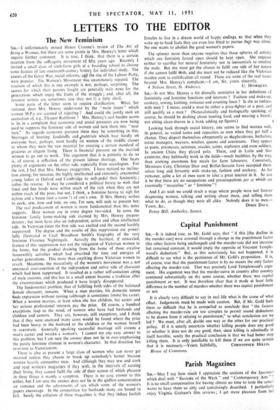Capital Punishment
SIR,--it is indeed true, as Mr. Gold says, that " if this [the decline in the murder-rate] were arrested through a change in the punishment factor (the other factors being unchanged) and the murder-rate did not increase but remained constant, it would imply the opposite of Viscottnt Temple- wood's deduction." But, as this notoriously has not happened, it is difficult to see what is the pertinence of Mr. Gold's proposition. It is, of course, true that the punishment-factor is by no means the only factor affecting the murder-rate. That was precisely Lord Templewood's argu- ment. His argument was that the murder-curve in country after country continued substantially on thz same course, whether there. was capital punishment or not. It was therefore clear that it made at least little difference to the number of murders whether there was capital punishment or not.
It is clearly very difficult to say in real life what is the cause of what effect. Judgements must be made with caution. But, if Mr. Gold feels them so difficult that he is compelled to conclude that "the factors affecting the murder-rate are too complex to permit sound deductions to be drawn from it relating to punishment," to what conclusion are we led ?- We must, after all, decide one way or the other for our practical policy. If it is utterly uncertain whether killing people does any good or whether it does not do any good, then, since killing is admittedly in itself horrible, surely the practical conclusion is that we had better stop killing them. It is only justifiable to kill them if we are quite certain
that it is necessary.—Yours faithfully, CHRISTOPHER HOLLIS. House of Commons.


































 Previous page
Previous page